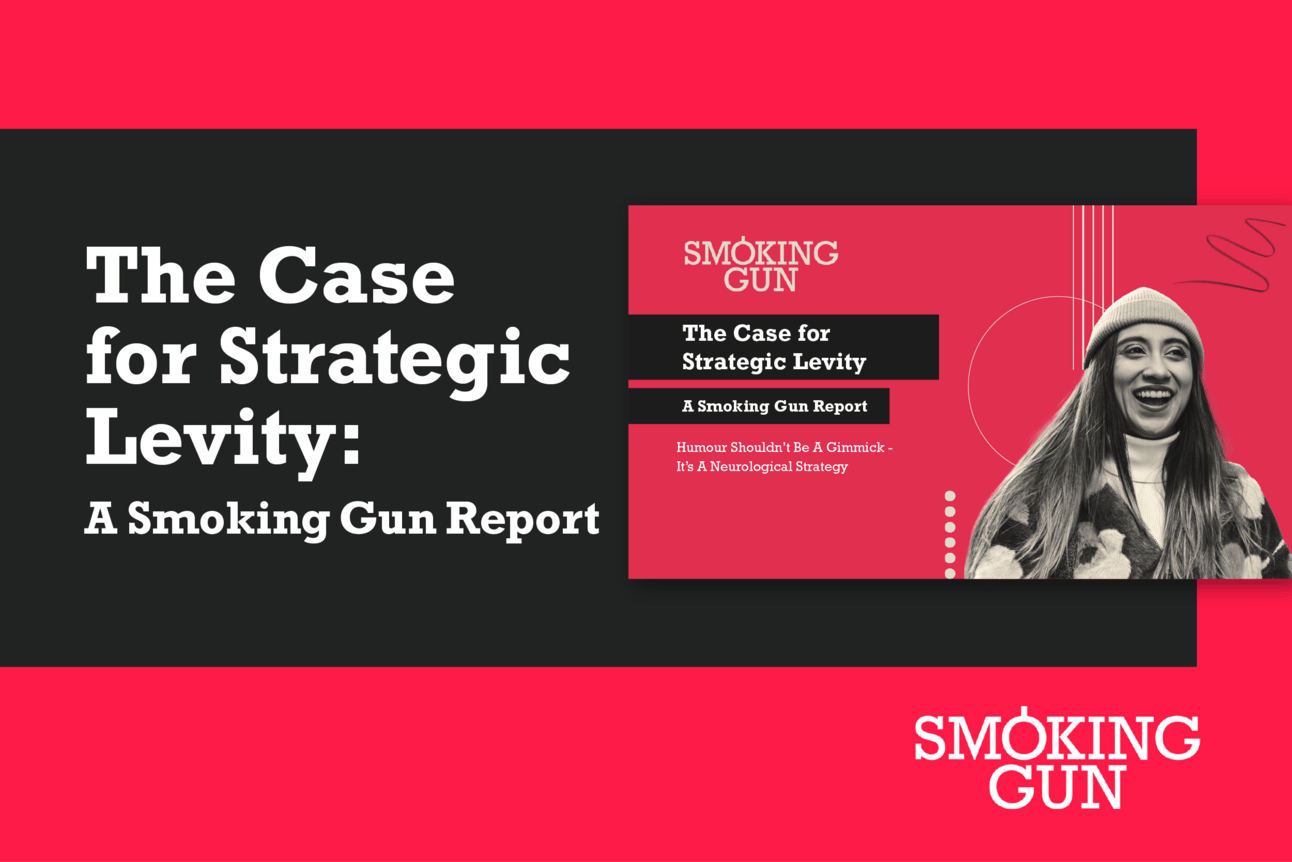Less Mask, More Impact: Why Soft Skills Are the Hard Edge of Modern Marketing Leadership
Marketing Unfiltered 36 - How Formative Institutions Shape Professional Identity
📝 EDITORS NOTE 📝
Greetings, Marketing Leaders ☀️!
Heatwave ✅ Wimbledon started ✅ Summer Holidays about to kick in full swing ✅ and a great article to help you re-think and shape the future - what a week.
This Week: MU writer Simon Swan dives deep into the cultural impact of work, why soft skills are going to be the competitive edge and why change agents have to be embraced and celebrated, not scorned and drowned out by KPIs and OKRs.
Thanks for reading again this week and have a great weekend!
Danny Denhard - LinkedIn
🔓 SMOKING GUN SPECIAL REPORT

Thanks to Smoking Gun for partnering with us to help you and other Marketing Leaders to improve PR and Marketing results.
Who are they? Smoking Gun is an award-winning PR, Social Media & Influencer agency. Harry has worked with Rick and the team and regularly vouches for them!
Need help getting smarter with PR and Marketing cut through - read their report below or on Google Slides https://docs.google.com/presentation/d/e/2PACX-1vSuH-CWo9m8KFNcO4m09ZeS1xJrU6t5dIVc5KvQ8P0nmK0jE2pYLCm8ovUTnXNWCjAQaN01_aGQMV71/pubembed?start=false&loop=true&delayms=3000&slide=id.p

The Case for Strategic Levity_ Smoking Gun Report
Smoking gun report on how to use neuroscience stick feed fatigue & reduce feed fatigue
3.33 MB • PDF File
Unofficial Rules & Unwritten Rules By Industry Peers
Less Mask, More Impact: Why Soft Skills Are the Hard Edge of Modern Marketing Leadership
Customer-centricity isn't a job title. It’s a cultural shift.
What’s truly needed is a mindset change across the entire organisation – one that balance collaboration over hierarchy, and empathy over ego.
To build organisations that genuinely reflect customer needs, we must enable fluid cross-office working, and foster a culture where customer insight is everyone's responsibility.
Easy, right?
This shift doesn’t happen through command-and-control. It’s not top-down. It relies on people at every level who can influence without authority individuals with strong soft skills, emotional intelligence, and the ability to navigate complexity and competing priorities, otherwise known as change agents - the connectors, communicators, and collaborators who champion the customer and bring others with them.
Soft Skills?!
Perhaps not shaped by job titles but more driven by the challenge to work better, who can inspire across boundaries, connect ideas across teams, and embed the customer’s voice, driving what has been deemed “Soft Skills”.
A recent Econsultancy 2025 Future of Marketing survey drove the importance of soft skills inside organisations as the skills in demand for the future to adapt to growing uncertainty through external factors, e.g. political and economic.
Pic: From the econsultancy 2025 future of marketing survey
The Age of EQ
We’re living in an age defined by data, dashboards, and what the algorithm deems relevant. Emotional intelligence, collaborative mindset, and genuine curiosity are the skills that will complement data, to add the narrative and the actions to take, to build connections across teams and departments and external partnerships to drive new ways of working.
EQ isn’t necessarily learnt from an instruction manual; it’s more about the individual having a pulse on the role and opportunity for the business and led by data insights to open doors. So, the question is, how can we drive and champion more EQ?
The Corporate Mask: Lessons from the Boarding School Model
“How Formative Institutions Shape Professional Identity
Some professional environments still reward a particular kind of polish — strategic language, curated self-presentation, and fluency in power dynamics.
These behaviours were not learned in the workplace, but in earlier environments designed to produce future leaders
You quickly learn how to read a room, manage appearances, and perform a version of yourself that wins approval.
What emerges is a kind of “survivor personality” — perhaps skilled in optics, motivated by external validation, and fluent in institutional expectations. It’s not necessarily about connection; it’s about adaptation.
Meetings resemble performances, status is managed like a resource, and long-term strategy often hinges on perception. It isn’t malicious — it’s just how the system was built.”
But what is the cost to Performance?
Innovation stalls. Silo walls get higher. Digital transformation can get stuck because no one feels safe enough to challenge the old playbook or do it their way.
People protect their KPIs, but forget to pursue shared outcomes and those wider opportunities that are not necessarily easy to measure
Can a new or different system really reflect and score collaboration?
In Marketing communications, where every channel is interconnected and change is constant, this kind of culture is lethal.
You can’t lead brand growth across platforms and teams if your people are stuck or rewarded in self-preservation mode. Jane McConnell, author of Gig Mindset, rather champions businesses to adopt a “reverse leadership” approach:
Resilience is strengthened in organisations where it is recognised that leadership exists at all levels (within a business). Leaders are people who exert influence that brings about change….Gig mindsetters are often invisible leaders through their own behaviours that influence others”.
Our very own Danny Denhard from Marketing Unfiltered refers to this mindset as the “hidden leader” and is discussed in more detail in this Isolated Talk below:
Soft Skills Are the Strategy
To drive meaningful progress, Marketers need more than data fluency.
They need what might look, on the surface, “softer”:
Emotional Intelligence: to build trust across departments
Curiosity: to challenge legacy assumptions
Humility: to admit what we don’t know (yet)
Empathy: to understand real consumers and colleagues alike
Collaborative Influence: to get things done in a matrix without owning every lever
A New Work Reality: Soft Skills in a Post-Job World
Recent insights from business thinkers and AI observers show that the future of work is arriving faster than predicted.
As author and futurist Heather E. McGowan points out, the very structure of jobs is eroding: work is becoming unbundled from traditional employment. The shift away from full-time, office-based roles to agile, distributed, AI-enhanced work models is not just coming, it's already here.
In a world where AI agents scope projects in minutes, creators can build businesses overnight, and lean teams achieve what used to take departments, the need for human adaptability, not just traditional hard skills — becomes non-negotiable.
If work is becoming modular and borderless, then the glue holding it together is not hierarchy or control - it’s trust, collaboration, and “soft power”.
Companies Getting It Right
Some brands are showing us what this looks like:
Buurtzorg: a healthcare organisation - nurtured soft skills by decentralizing control, fostering trust and enabling self-management
Timpsons: Adopts a servant leadership model, where leaders focus on supporting and developing their teams rather than exerting control. This approach fosters an environment where soft skills like empathy, communication, and collaboration are valued and nurtured.
Patagonia: empathy-led decision making, rooted in their company values
Spotify: agile structures that empower cross-functional collaboration
TDIndustries - A construction services company with servant leadership baked into its culture, prioritising people and community.
If we relate this to the traditional hierarchy of a business (or indeed schools), IQ may predict the type of job you could get, but once you are in those professions, everyone is at the same level. EQ is the part that differentiates
It’s important to note, these companies won’t be for everyone, the traditional power players could come unstuck in these workplaces.
The Real Future of Marketing Leadership
We often talk about the future of Marketing as being more technical, more automated, more AI-enhanced. And yes, that’s true. BUT, equally important is a need to build emotional intelligence (EQ). Leading with intent, asking better questions, being inquisitive, removing the ego and learning to collaborate are some of those core skills that are not necessarily taught from the traditional theme of corporate life, but it’s clear they are much needed now
Author Richard Tobaccowala, in his recent blog, referred to this much-needed skill set:
“Humans are social beings and most need some form of connection. The ability to invest and grow connections tends to be associated with joy.
We are living in an interconnected and multi-polar world of 8 billion people with countries proud of their history and hopeful for tomorrow that all want a place and voice in the future.
Connection turns data into intelligence in AI, a series of words into stories that move us, and connection works via genetics into progress across centuries”
💭 So the question to leave you to ponder this weekend:
Will you be a leader that promotes softer skills, allows the connectors to build bridges and work smarter connecting with their colleagues to get the most out of projects and campaigns and drive business success or will you not want to drive change and operate in the status quo not to rock the boat or you had to come up in a different system?
In a world where data is everywhere but true connection is rare, Emotional intelligence, curiosity, empathy, and collaborative influence are no longer optional; they’re what enable marketing leaders to drive change, break silos, and champion the customer across complex, fast-moving organisations.
Simon Swan - connect with me on LinkedIn and let me know what you think of the future.
Editor's Note 📝: Views expressed in this article are Simon’s own and do not represent those of his employer.
Do YOU Have Strong Opinions? Or Have Something Unfiltered To Say About Marketing, Growth Or Business?
We are always looking for great writers and contributors to articles, podcasts and deep dives. Let us know by clicking the button below
5 Takeaways From Last Week’s MU Article
The 35 unwritten rules of Marketing (well, 47 - I couldn’t not include the bonus ones) in 5 condensed bullet points
Work on business politics and understanding/removing egos.
Foster a learning culture within the team
Never stop building cross-departmental relationships
Stay close to customers
Own your professional development and be proactive in learning
Thanks For Reading This Week
Thanks again for reading this week.
Care To Share?
Danny Denhard - coaching this summer in a dedicated summer coaching programme 👀
P.S. Are you new here? Hit reply and let us know about you and if we can answer of your problems or puzzles as a newsletter!

